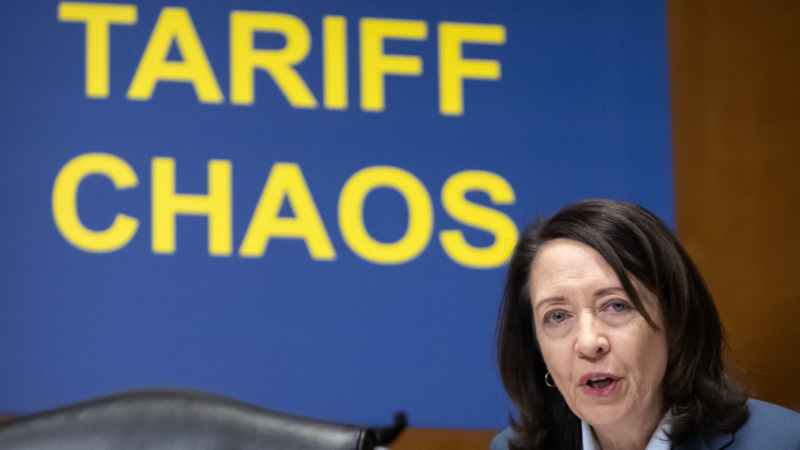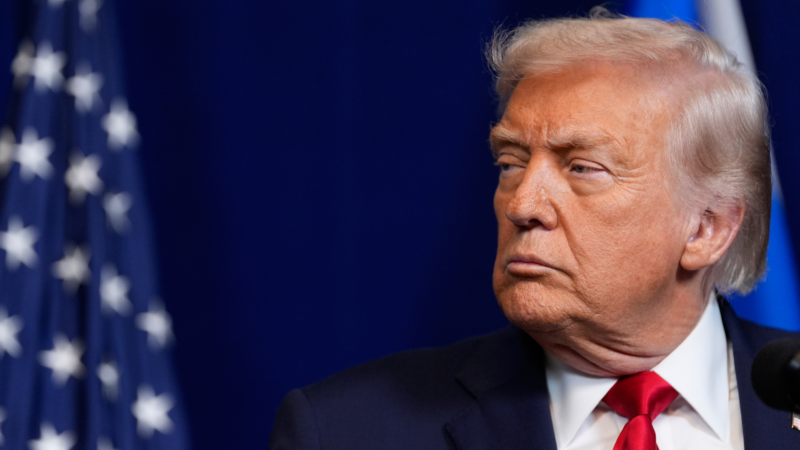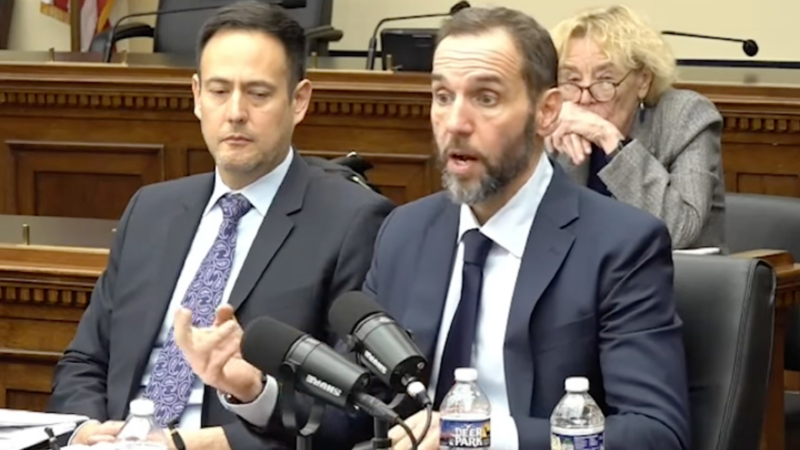Sen. Maria Cantwell says there is bipartisan support to rein Trump’s tariffs
President Trump’s escalating tariffs on trading partners has not only rattled U.S. and international markets – it’s also set off alarm bells in Congress.
In response, a group of Senators have introduced bipartisan legislation to reign in presidential power on tariffs. Sens. Maria Cantwell, D-Wash. and Chuck Grassley, R-Iowa have introduced a bill requiring the president to notify Congress of impending tariffs within 48 hours. Congress would have to approve of the action within 60 days of notification.
President Trump has threatened to veto the bill that already had slim prospects of passing as it is unclear if it would even get a vote in the House.
In an interview with Morning Edition, Cantwell said “We are the conduit to those constituents. Those sectors of the economy, like agriculture or manufacturing or small business who are being hurt.”
NPR’s Leila Fadel spoke to Cantwell about the future of the bipartisan bill – and what she’s hearing from constituents affected by the tariffs.
This interview has been edited for length and clarity.
Interview Highlights
Leila Fadel: What would the bill you’ve drafted accomplish if it became law?
Sen. Maria Cantwell: Congress constitutionally has the right on trade, really, if you think about it, on interstate commerce and foreign commerce. But this president has misconstrued and we think actually misused this authority. So we’re saying we want Congress to reassert itself in this debate and get approval for these unbelievable tariffs that are costing consumers so much money and ruining people’s 401(k) savings.
Fadel: Now, this is described as a bipartisan bill. You co-authored it with Sen. Chuck Grassley, a Republican. But how much Republican support is there for this bill? I mean, can it pass?
Cantwell: We have seven Republicans on the bill so far, which was just introduced last week. The House representatives introduced a bill with two Democrats and two Republicans. So it is continuing to be bipartisan, bicameral. And, I think, it’s because people are hearing from their constituents who are saying, “Wait, why am I paying this extra tax on these consumer goods? I don’t want to do it.”
Fadel: Now, the president has threatened to veto your bill if it ever comes to his desk. What would you do in that case if you get this bill passed and Trump vetoes it?
Cantwell: I don’t think people thought the economy was going to drop $11 trillion in investment either. This is wreaking havoc on consumers. Basically GDP is about 70% consumer spending. So Congress has a right to say, “what is the plan here? Why aren’t you consulting with us as we have to consult with our constituents?”
And the thing that people don’t want is to have continued uncertainty. A lot of people who are looking at their 401(k), and were maybe going to retire this year, have great concerns about what that means for them personally.
Fadel: But what I’m asking is if there is a true path in both chambers to get this to become law?
Cantwell: Oh, for sure. This continues to be an economic nightmare for people. Yes, there will be a path.
Fadel: And if Trump vetoes the bill, you would need to get two-thirds in both chambers for it to pass. Are there other paths or are there other options?
Cantwell: Well, my colleague, Sen. Ron Wyden, D-Oregon, is introducing another resolution related to this. So the good news is that our colleagues are waking up to the fact that the president went too far and that we need to have a discussion. We need to listen to our constituents. We need to listen to the small businesses. We need to listen to the consumer who’s being hurt here and decide what it is that we can do to reassert ourselves in the debate.
Note: Wyden’s privileged resolution would force a vote on the emergency declaration under which President Trump instituted the global tariffs, according to a statement from Wyden and other senators who have signed on to it.
Fadel: Now, Trump says the tariffs are necessary short term pain or medicine to deal with this long-term problem of the $1.2 trillion trade deficit. Do you agree with that?
Cantwell: I disagree. First of all, we need to continue to drive inflation down. A tariff is just like a tax that’s going to make everything more expensive at the grocery store, at the appliance store. If the president wanted to use power, he should unite people collectively, like the Europeans or other Asian countries and try to counter China that way through a coalition. And then they could force open markets or force more fair accommodations.
Fadel: That would be the approach you would support to closing the trade gap?
Cantwell: Oh, for sure, yes. I represent one of the most trade-dependent states in the country. And so we’re very proud that we make airplanes, that we grow a lot of agricultural products. So we want the United States to be a leader in the economy of tomorrow and all the job creation that is going to come with that. And we think that the way you get there, just like these companies have become big juggernaut companies in the Northwest, is by innovating, having a great skilled workforce and by having open markets to sell your product to. There are strategies to take the next step that would help the United States in an information age win more market share. And we should be doing that versus kind of taking our best trade allies and making them mad at a time when we really need them to be on our side.
Zohran Mamdani sworn in as New York City mayor, capping historic rise
Mayor Zohran Mamdani took the oath of office in New York City after midnight Thursday. The city's first Muslim mayor, a member of the Democratic Socialists of America, has promised to focus on affordability and fairness.
Rising from the ashes, a symbol of hope at the Rose Parade
Survivors of the Eaton and Palisades Fires find healing and community working on a Rose Parade float to honor the lives and communities lost in last year's wildfires.
The history behind the NYC subway station chosen for Mamdani’s swearing-in
The city shut down the station in 1945 on New Year's Eve. Eighty years later, it's a symbolic venue choice for the incoming mayor's private swearing-in ceremony.
U.S. military strikes 5 more alleged drug boats, killing 8
The U.S. military says it struck five alleged drug-smuggling boats over two days. The attacks killed eight people, while others jumped overboard and may have survived. U.S. Southern Command did not reveal where the attacks occurred.
Capitol riot ‘does not happen’ without Trump, Jack Smith told Congress
Former special counsel Jack Smith also described President Trump as the "most culpable and most responsible person" in the criminal conspiracy to overturn the 2020 election results, according to a transcript of Smith's closed-door interview with the House Judiciary Committee.
Trump will drop push for National Guard deployments in Chicago, LA and Portland, Ore.
Courts blocked troops from deploying in Chicago and Portland, Ore., and the Los Angeles deployment effectively ended after a judge blocked it earlier this month.







